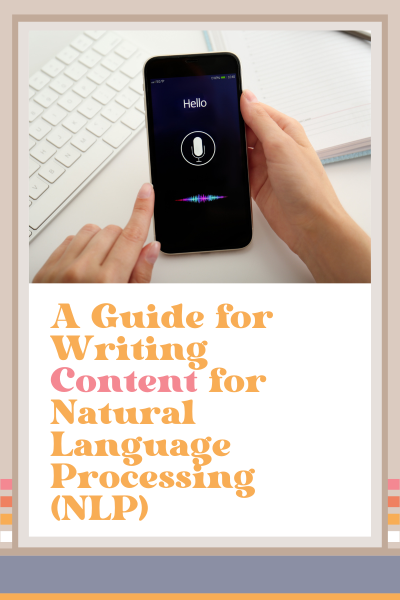A Guide for Writing Content for Natural Language Processing (NLP)
Writing content with Natural Language Processing (NLP) in mind means keeping things clear, natural, and structured.
Search engines and AI tools are getting better at understanding language, which means content should feel more human while still being organized in a way that AI can process.
This guide will cover the basics of writing for NLP, including best practices, SEO strategies, and ways to create content that works well for both people and algorithms.
What Is Natural Language Processing (NLP) and Why Does It Matter for Content?
Natural Language Processing (NLP) is how computers analyze, understand, and generate human language. Search engines like Google use NLP to process search queries, determine content relevance, and rank pages based on clarity and usefulness.
For content creators, this means writing should be natural and easy to understand. Long gone are the days of keyword stuffing—now, search engines favor well-structured, contextually relevant content.
How NLP Affects Content Writing
Better search rankings – Content that aligns with NLP principles is more likely to appear in relevant searches.
Improved readability – AI values well-organized, easy-to-read text.
Context over keywords – The focus is on meaning rather than just exact-match keywords.
FAQ
Q1: Does NLP mean I have to write differently?
A1: No, but it does mean you should focus on clarity, structure, and natural phrasing instead of forcing keywords.
Q2: How does Google’s NLP work?
A2: Google looks at intent, structure, and readability, not just individual words.
How to Write Content That Works Well With NLP
Writing content for NLP means focusing on coherence. Instead of overloading text with keywords or complex wording, the goal is to create content that’s well-organized and natural.
Here’s how to do it:
1. Use Clear and Natural Language
Write like you’re talking to a person, not a robot.
Avoid overly complex sentences or jargon.
Keep paragraphs short and to the point.
2. Structure Content With Headings and Lists
Break up text with H2s and H3s.
Use bullet points for key takeaways.
Keep sections focused on one main idea.
3. Focus on Context, Not Just Keywords
Use related terms instead of repeating the same keyword.
Answer common questions within your content by adding FAQs to each section.
Write in a way that feels natural instead of forcing SEO tactics—it should sound like talking to a friend.
4. Optimize for Voice Search
Use conversational phrases and question-based headings.
Include direct answers in simple language.
Keep sentences concise and easy to read out loud.
FAQ
Q1: Can I still use keywords?
A1: Yes, and you should because SEO is not dead. Just be sure they fit naturally within the content instead of feeling forced.
Q2: What if my content is technical?
A2: Break down complex ideas into clear, structured explanations.
Q3: Do bullet points really help with NLP?
A3: Yes, they improve readability and make information easier to process.
SEO Tips for NLP-Friendly Content
Writing for NLP and writing for SEO go hand in hand. Here are a few simple ways to align your content with both:
1. Write Descriptive Meta Titles and Descriptions
Use natural phrasing in your meta descriptions and include your primary keyword (naturally, of course).
Summarize what the reader will learn in a clear way.
2. Improve Readability With Short Sentences
Keep sentence length varied, but avoid long, complex sentences and run-ons.
Keep sentences direct and to the point.
3. Answer Common Questions Directly
Include FAQs or a Q&A format in your content.
Use direct answers to improve chances of appearing in featured snippets.
FAQ
Q1: Do I need to rewrite old content for NLP?
A1: Not necessarily, but updating older posts for clarity and structure can help.
Q2: Does voice search impact SEO?
A2: Yes, since people tend to ask full questions in voice search, content that mirrors conversational language performs better. Even though voice search users might not always click through to a website, optimizing for voice search still benefits overall SEO for your website.
Key Takeaways
Writing for NLP focuses on clarity, structure, and natural flow. When content is easy to read for both people and AI, it becomes more effective in search rankings and user engagement.
Simple, well-organized text helps search engines process information accurately while keeping readers interested.
Have you made adjustments to your writing to keep up with the latest in AI technologies? How so? Please share your thoughts in the comments. 👇
This page contains affiliate links
Like this post?












